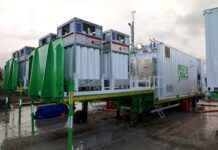
At Scottish Renewables’ Marine Conference in Inverness on 13 September, director of policy Jenny Hogan used her opening speech to call for greater clarity on future support for the wave and tidal power sectors.
In her speech, Ms Hogan said: “All of this progress – in research, testing and deployment – has led to the marine energy sector as a whole investing hundreds of million pounds into the Scottish economy.
“Every £1 from public funds has typically leveraged around £7 from private investment, and the sector has created around 1,000 jobs in Scotland, with the potential for substantial further growth.”
But she warned this progress is in jeopardy without a viable route to market.
If wave or tidal energy schemes must compete directly against other, more mature renewable energy technologies in upcoming competitive auctions it is likely these innovative, emerging technologies will not qualify for contracts to sell their power.
Smaller projects face similar uncertainty.
Ms Hogan continued: “Large-scale projects need a meaningful way to access long-term contracts for power.
“Scottish Renewables has been working hard to put the case to Whitehall to make provision for supporting a minimum amount of marine energy capacity in the upcoming Contracts for Difference auction round, due to be announced later this year.
 “For smaller-scale, innovative technologies, looking to scale up from the lab or test centre, clarity of support is also crucial.
“For smaller-scale, innovative technologies, looking to scale up from the lab or test centre, clarity of support is also crucial.
“We need to keep working with government to find a way to keep these projects moving forward and to strike the right balance between revenue and capital support.”
Scotland’s wave energy sector has achieved a great deal, with Wave Energy Scotland leading the charge in terms of supporting innovative technologies as they progress to demonstration phase.
In tidal energy, Scotland has been home to the first array, energised by Edinburgh-based Nova Innovation in the Bluemull Sound off Shetland. In Orkney Scotrenewables recently began testing of the world’s most powerful tidal stream turbine at EMEC, and the largest free-stream tidal power array in the world, MeyGen, was launched on 12 September.
Ms Hogan said: “Further development is absolutely dependent on continued support from Holyrood, Westminster and Brussels, which have all played a vitally important role in the growth of the sector to date.
“Projects going in the water over coming months urgently need clarity on support.”







